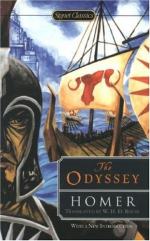He bids them bring their stores; the attending train
Load the tall bark, and launch into the main,
The prince and goddess to the stern ascend;
To the strong stroke at once the rowers bend.
Full from the west she bids fresh breezes blow;
The sable billows foam and roar below.
The chief his orders gives; the obedient band
With due observance wait the chief’s command;
With speed the mast they rear, with speed unbind
The spacious sheet, and stretch it to the wind.
High o’er the roaring waves the spreading sails
Bow the tall mast, and swell before the gales;
The crooked keel the parting surge divides,
And to the stern retreating roll the tides.
And now they ship their oars, and crown with wine
The holy goblet to the powers divine:
Imploring all the gods that reign above,
But chief the blue-eyed progeny of Jove.
Thus all the night they stem the liquid way,
And end their voyage with the morning ray.
BOOK III
ARGUMENT
The interview of telemachus and Nestor.
Telemachus, guided by Pallas in the shape of Mentor, arrives in the morning at Pylos, where Nestor and his sons are sacrificing on the sea-shore to Neptune. Telemachus declares the occasion of his coming: and Nestor relates what passed in their return from Troy, how their fleets were separated, and he never since heard of Ulysses. They discourse concerning the death of Agamemnon, the revenge of Orestes, and the injuries of the suitors. Nestor advises him to go to Sparta, and inquire further of Menelaus. The sacrifice ending with the night, Minerva vanishes from them in the form of an eagle: Telemachus is lodged in the palace. The next morning they sacrifice a bullock to Minerva; and Telemachus proceeds on his journey to Sparta, attended by Pisistratus.
The scene lies on the sea-shore of Pylos.
The sacred sun, above the waters raised,
Through heaven’s eternal brazen portals blazed;
And wide o’er earth diffused his cheering ray,
To gods and men to give the golden day.
Now on the coast of Pyle the vessel falls,
Before old Neleus’ venerable walls.
There suppliant to the monarch of the flood,
At nine green theatres the Pylians stood,
Each held five hundred (a deputed train),
At each, nine oxen on the sand lay slain.
They taste the entrails, and the altars load
With smoking thighs, an offering to the god.
Full for the port the Ithacensians stand,
And furl their sails, and issue on the land.
Telemachus already press’d the shore;
Not first, the power of wisdom march’d before,
And ere the sacrificing throng he join’d,
Admonish’d thus his well-attending mind:
“Proceed, my son! this youthful shame expel;
An honest business never blush to tell.
To learn what fates thy wretched sire detain,
We pass’d the wide immeasurable main.
Meet then the senior far renown’d for sense
With reverend awe, but decent confidence:
Urge him with truth to frame his fair replies;
And sure he will; for wisdom never lies.”




